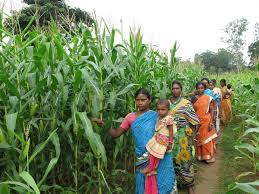Women’s groups in rural Bihar have been active ever since the Bihar Mahila Samakhya took shape as part of the Bihar Education Project way back in 1992. Over two decades later, Mahila Samakhya touches all areas that affect and influence the lives and livelihood of women: literacy and education, income and savings, maternity and health, community life and association, social justice and legal awareness, that empowers them towards informed engagement with domestic issues as well as matters of civic interest and local governance. It boasts of 9,774 strong women’s groups, 9,520 adolescent girls Samoohs, 33,000 members of the federations and functionaries across the state. But how does this play out on ground zero?
Here are some true stories.
Kundan Kumari of Khagaria told us of Shakila in Sultanpur village. “The situation n Shakila’s village was getting worse. A lot of the men had taken to gambling in the village orchard. Gambling would go on from 8 in the morning till past 10 in the night. Our huts would be dark, but lamps would be burning in the ‘bagicha’. When these men would lose their money, they would bully their wives to give them the housekeeping money. Shakila was also a victim, because her son was one of the gamblers. Shakila was also a member of the ‘Nari Adalat’. She went to the Madaiya police station and narrated the sad story in detail to the officer in charge. He drove down to the village, where she pointed out the gambling spot from afar. A few days later, the police picked up four gamblers and thrashed them, letting them go with a warning. But after a few days the gambling started again. So Shakila went back to the police station again. The police repeated the raids on the gamblers. This happened three times. Twenty one gamblers were picked up and disciplined by the police. One of them was her son. The police kept Shakila’s identity a secret.
Shakila said that when her son came back groaning after the beating, her heart leapt with joy. ‘Oh, every time he said ‘aah’, my heart said ‘aha’! she said. The young men have stopped gambling in the orchard. They are scared of the police. I can say that many, many women of the village are happy!
Bihar is almost infamous for its treatment of people with HIV. Even doctors discriminate against HIV positive people sometimes.
Poonam Devi from Parvata Block, Khagaria spoke of a family in Lagar village, where a man and his wife died of AIDS related causes, leaving behind four children.
The grandmother learned , in the course of a women’s orientation workshop on HIV, that HIV can be passed on to the children of infected mothers at birth. She asked her Mahila Samooh group for help. The women’s group members not only supported her, some of them accompanied her to the ICTC and got the kids tested. It turned out that three of the children were HIV positive. The women’s group and Poonam, the facilitator, helped the grandmother apply for the Parvarish Yojana, a government scheme to help children with HIV. Recently, the children began receiving aid through the scheme. Where there are so many stories of prejudice against HIV positive people, the solidarity of these simple women should make you smile on a Sunday!


